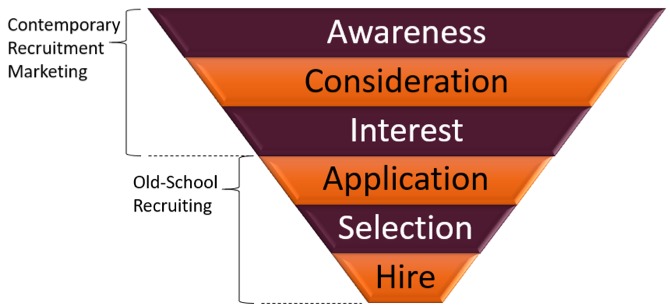If you follow any of the big analyst companies, you may have seen a recruitment marketing funnel that looks like this:

The theory behind this funnel is that in the pre-digital days, or in times of high unemployment, candidates pretty much came to recruiters directly via an application, were then screened in various ways, and hired if they passed the screening. In the digital age, and because unemployment is extremely low, recruitment marketing is needed to fill the top of the funnel – to create awareness, consideration, and interest among candidates. This is true, and it’s not at all hard to prove that it’s a necessary step. Just Google “statistics on recruitment marketing,” and you’ll come up with research gems like 70% of job seekers consider an employer’s brand heavily in their search (Talent Sorter), and employee turnover can be reduced 28% by investing in employer branding (Job Vibe).
But here’s the dirty little secret of recruitment marketing …it’s not about turnover or job seekers – well, not entirely. What it’s really about is making recruiters’ jobs easier by helping them attract talent.
Look again at the funnel graphic. You’ll notice that recruitment marketing doesn’t replace the traditional recruiting function – it enhances it. Recruiters still need to source, screen, and hire great people for their clients. Recruitment marketing just makes those steps a little easier. Where a candidate falls in the recruitment marketing portion of the funnel determines just how much easier it will be to advance deeper into the traditional stages successfully.
I’ll explain:
- Awareness – wouldn’t you rather go to work for a company you’ve heard of than a random organization with almost no digital footprint? This correlates most fundamentally to the traditional marketing concept of reach, or in layman’s terms, eyeballs. How many people have come in contact with your brand? Have you created some level of familiarity? When the recruiter calls, will they know the name of the company?
- Consideration – beyond awareness, consideration indicates a willingness to think about possibilities at a company. The job seeker has likely seen more content, and maybe even read some blog posts on the careers site, but hasn’t necessarily gone as far as looking for a specific position on the site. This is a classic passive candidate who is ripe for a recruiter call or a LinkedIn message.
- Interest – this candidate has done everything short of applying for a specific position. They’ve probably searched your job postings but haven’t found a match yet. They may have even networked with others at the company to find out more and followed the company on social media. If you’re a recruiter with the right position, this person is just waiting to hear from you.
As a recruiter, how do you leverage the power of this machine? It’s easy – communicate your hard-to-fill positions with your recruitment marketing team. They’ll appreciate it – it helps them target their content to best help you attract the candidates you want, and it will make your job all that much easier.
